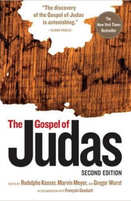An Ancient Text Lost for 1,700 Years Says Jesus' Betrayer Was Not a Traitor, He Was a Hero!5/9/2017 RESURRECTION, PAUL, JESUS AND EASTER An Exciting Discovery: “The Hidden Gospel of Judas” Installment 7 A very exciting thing happened to me yesterday. I was working on Episode 7 of this blog when the thought came to me that even though Paul was in Jerusalem for a two week stay (with Peter and Jesus’ brother, James), just a few years after Jesus died, he never mentions Judas in any of his writings—anywhere! If Judas (one of the 12 original Apostles) had been the infamous traitor responsible for Jesus’ death, wouldn’t that have been a big deal? Wouldn’t you have thought that Paul would have heard about it? Wouldn’t you think that in all of Paul’s letters he would have used Judas as an example to keep his wayward flock in line? He certainly made use of threats and literary devices to cajole and threaten his churches to follow his vision of Jesus’ message and place in the cosmos, but nowhere in any of his writings does he mention Judas. I would think that Paul might have made some reference to him somewhere in his writings (saying something like, “you don’t want to betray Christ like Judas did, do you?”), yet, it appears that Paul doesn’t have any knowledge of Judas being this arch villain responsible for Jesus’ betrayal and death. It seems that Paul would have heard at least a few stories about the guy, unless the story of Judas being a “traitor” hadn’t been invented yet. What? How could that be? There is no way of knowing, of course, but this thought led me to remember that not too long ago I had heard about a gospel (the Secret Gospel of Judas) that had been discovered in the deserts of Egypt in the 1980’s, and was first translated around the year 2000.  Gospel of Judas Codex Gospel of Judas Codex Like all of the canonical Gospels, the author of the Gospel of Judas remains anonymous, but it is thought to have been originally written sometime between when the New Testaments Gospels were written (70 – 100CE) and 180 CE. The Gospel was probably written early in the second century, like the book of Acts, and perhaps even the Gospel of John, the gospel of James, Thomas (parts of which may predate the first canonical gospels), and others in circulation during the early years of Christianity. In The Secret Gospel of Judas, Judas was definitely not a traitor. He was a hero, doing Jesus’ will by turning him over to the authorities. Quoting from the extensive article in National Geographic (who sponsored the translation), “The ‘secret account’ gives us a very different Judas. In this version, he is a hero. Unlike the other disciples, he truly understands Christ’s message. In handing Jesus over to the authorities, he is doing his leader's bidding, knowing full well the fate he will bring on himself. Jesus warns him: ‘You will be cursed.’” HOLY COW! This hit me square in the face because in my book, The Disciple, The Writing of the First Gospel, and from my memories as Asher, this is exactly the roll that Judas played! Until I read the article I had no idea that any ancient document would agree perfectly with my memory of Jesus and Judas. Up to now I didn’t know of a single recorded account of Judas that wasn’t in lock-step agreement with the four official Gospels. Continuing to quote from the NatGeo article, “While Christians like Irenaeus [Bishop of Lugdunum in Gaul, in modern day France] stressed that only Jesus, the son of God, was simultaneously human and divine, the Gnostics [such as this Gospel appears to be] proposed that ordinary people could be connected to God just like Jesus. Salvation lay in awakening that divine spark within the human spirit and reconnecting with the divine mind. Doing so required the guidance of a teacher, and that, according to the Gnostics, was Christ’s role. Those who grasped his message could become as divine as Christ himself.” Fascinatingly, this is exactly what Asher was taught by Jesus, and it is in that role (as a special prophet), that is how the Muslims honor Jesus as well. Jesus in Islam – partial excerpt from Wikipedia “In Islam, Jesus is understood to be the penultimate prophet and messenger of Allah (God) and al-Maish, the Arabic term for Messiah, the Christ, sent to guide the Children of Israel with a new revelation. Jesus is believed to be a prophet, who neither married nor had any children, and is reflected as a significant figure, being mentioned in the Quran in 93 verses with various titles attached such as “Son of Mary”, “Spirit of God”, and the “Word of God” among other relational terms, directly and indirectly, over 180 times. In total, Jesus is mentioned 187 times in the Quran…” I’m not endorsing the Gospel of Judas, but this excerpt from the NatGeo article was a fascinating read. If you are interested, you can read about the Gospel of Judas here:  You can also go to Amazon Books and choose to purchase your own copy from one of many authors. Next, Installment 8, where we will look at what Paul thought about the resurrection and what it meant to him, and thereafter to the following generations. Make sure to watch for our next blog at: http://www.authortalk.audio/jesus-blog. |
AuthorArchitect, software CEO, 30-year student of the historical Jesus and early Christianity. Show host of AuthorTalk, interviewing religious and spiritual authors. Archives
May 2017
|

 RSS Feed
RSS Feed

